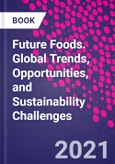Future Foods: Global Trends, Opportunities, and Sustainability Challenges highlights trends and sustainability challenges along the entire agri-food supply chain. Using an interdisciplinary approach, this book addresses innovations, technological developments, state-of-the-art based research, value chain analysis, and a summary of future sustainability challenges. The book is written for food scientists, researchers, engineers, producers, and policy makers and will be a welcomed reference.
Please Note: This is an On Demand product, delivery may take up to 11 working days after payment has been received.
Table of Contents
1. Emerging trends and future sustainability challenges in the global agri-food sector
2. Approaches for sustainable food production and consumption systems
3. Smart and sustainable food: What is ahead?
4. Climate change and future of agri-food production
5. Future grain crops
6. Expectations for household food security in the coming decades: A global scenario
7. Underutilized fruits: Challenges and constraints to domestication
8. Mainstreaming underutilized legumes for providing nutritional security
9. Designer food and feeds from underutilized fruits and vegetables
10. Seaweeds and microalgal biomass: The future of food and nutraceuticals
11. Current trends and next generation of future edible oils
12. Plant-based�milk products
13. Nutraceuticals and functional beverages: Focus on prebiotics and probiotics active beverages
14. Future innovations in alcohol-based beverage industry
15. Future Food Proteins: Trends and perspectives
16. Mycoproteins: A futuristic portrayal
17. Edible vaccines: Current scenario and future prospects
18. Sustainability challenges in edible bird's nest: Full exploitation and health benefit
19. The future of cultured meat between sustainability expectations and?socio-economic challenges
20. Meat alternatives
21. Innovations in food packaging industry: Sustainability challenges and future scenarios
22. The use of emerging dehydration technologies in developing sustainable food supply chain�
23. Gastronomy: A novel social representation of foods through�consumers' language
24. Neurobiology of food addictions
25. Human population genomics approach in food metabolism
26. Space food on celestial bodies and on the way there
27. Designer foods as an effective approach to enhance disease preventative properties of food through its health functionalities
28. What foods might kids eat in the future? The case of a plant-based game for shifting to sustainable healthy diets
29. Restoring the values of traditional foods
30. Between Conventionalization and Emancipation: Present and Future Paths for Organic Food Market Organization
31. Agricultural productivity and food supply to meet increased demands
32. High-productive agricultural technologies to fulfill future food demands: Hydroponics, aquaponics, and precision/smart agriculture
33. Food waste and by-product valorization as an integrated approach with zero waste: Future challenges
34. Food fraud countermeasures and consumers: A future agenda
35. ICT applications for the food industry
36. 3D food printing: genesis, trends, and future prospects
37. Non-destructive methods for detection of food quality
38. Authentication of wine and other alcohol-based beverages
Future global scenario
39. Food biotechnology: Innovations and challenges
40. Nanoscience and nanotechnology advances in food industry
41. Food quality monitoring via bioinformatics and big data�
Authors
Rajeev Bhat Professor and ERA-Chair Holder, Food By-Products Valorization Technologies (VALORTECH), Estonian University of Life Sciences, Tartu, Estonia. Rajeev BhatRajeev Bhat is a professor and the ERA Chair holder in Food By-products Valorization Technologies (VALORTECH) at the Estonian University of Life Sciences, Tartu, EU. He has an extensive research and teaching experience of more than 20 years in the field of agri-food technology, with research expertise focusing on various issues pertaining to sustainable food production and food security. He holds international work experiences in South Korea, India,
Malaysia, Germany, Fiji Islands, and now in Estonia. To date, he has nearly 250 research articles published in ISI based journals and as refereed book chapters; has edited seven and authored one book; is on the editorial board
of leading International journals; has been a scientific committee/advisory board member and an invited speaker in various international conferences. His name now figures in the World's top 2% scientists in the field of Food
Science & Technology as per the survey done by Stanford University based researchers. He has completed several sponsored research and consultancy projects with funding received from various agencies. Prof. Bhat has also been
a visiting professor in many of the renowned universities and is a recipient of several prestigious international awards and recognitions conferred by various institutions of higher learning and research establishments.








